14
Self-love
THINGS THAT DO NOT DEFINE YOU

Growing up, we go through the journey of understanding who we are and how we see ourselves. It's a difficult pathway, filled with the opinions of others, the judgement of societal ‘norms' and the pressures of our family and friends trying to define who we are. For many of us, it leads us to try to fit into a certain box so that we feel we belong, or achieve certain things so we feel important and worthy. We attach our self-worth to arbitrary things like our job title, our education or our income, while losing touch with what really matters and who we truly are. While there are a number of aspects of our lives that shape who we are, they definitely do not define us.
YOUR JOB
Society places a significance on the work and occupation of each individual, and often tries to group or stereotype people based on this. This filters down to an individual level, where many people still define themselves by their jobs and judge others using the same. How many times have you met someone new and the first thing they ask is: ‘So what do you do?’ We spend a lot of hours in our week at work. But at the end of the day, your job is just a job. It does not define your worth or who you are. It does not determine how intelligent or worthy or important you are. No matter what field you are in or where you work, you have value.
OTHER PEOPLE'S OPINIONS
We have all struggled with wanting to be accepted by others. We want to feel liked, respected and acknowledged by the people around us and, unfortunately, in a lot of cases, by people we don't know online. If we base our lives and our actions on pleasing others, we lose focus on staying true to ourselves and showcasing who we truly are. Similarly, if you define yourself by the number of likes you get or how many followers you have on social media, you will never be satisfied or feel ‘good enough’, as your worth is based on arbitrary numbers from people online. You are never going to please or be liked by everyone, so why not be the most authentic version of yourself.
YOUR AGE
Have you ever thought to yourself that you're ‘too young’ or ‘too old’ for something? Or maybe you've dreaded a birthday in the fear of getting older? We are conditioned to view our age as a defining factor of who we are and what we can or cannot do. We grow up being told that there is a particular timeline that our lives should follow, and that we should achieve certain things by certain ages or else we have ‘missed the boat’. The truth is, there are no rules you have to follow. There are no age limitations on when you can do something. Stop constructing your whole life around your age and focus on living your life on your own terms.
YOUR INCOME
Your income or the amount of money you have does not define who you are. Society and social media portray a false narrative of defining our self-worth, success and happiness by the amount of money we earn or have. We all have different values and goals when it comes to money. We also all come from different backgrounds, with different circumstances, privileges and opportunities. Money provides a level of comfort, security and options. But it does not determine whether or not you are a good or happy person. What is important is that you foster a positive relationship with your money and use it to work towards your personal financial goals.
YOUR ACADEMIC EDUCATION
The pathways to a happy and successful life are endless, and they do not solely rely on a formal education, such as university or college. In many cases, the value you bring in your work life and career will be the result of your skills and experience, regardless of your formal education. You should not define yourself by your level of education, and nor should you look down on others who do not share the same level of education as you.
YOUR RELATIONSHIP STATUS
Whether you are single, in a relationship, separated or divorced does not define the person who you are. Having a partner does not mean that you are happier, more successful or have a better life. You can accomplish amazing things and be single. You can do the same and be in a relationship. Do not diminish or elevate your self-worth based on your relationship status. Take the opportunity to be the best version of yourself as an individual.
YOUR PAST MISTAKES
Your past mistakes and failures provide you with experiences and lessons you can take forward into your life. They don't define who we are or what we can go on to be. The weight of our past mistakes can hold us back from taking steps forward in our present life. While your past experiences, family life and the challenges and adversity you faced in your life shape your development, they do not define your current self.
For example, if you define yourself by a previous relationship and the mistakes you made, you are failing to acknowledge the effort you put in to heal and grow from the experience. Holding on to the past instead of looking forward towards future possibilities will hold you back from believing you are capable and going after new opportunities.
WHAT DOES DEFINE YOU
Here are some things that do define you:
- how you treat yourself, your partner, friends and family
- how you treat strangers
- your attitude
- your habits and routines
- your thoughts and actions
- your morals and values
- your kindness.
HOW TO STOP FEELING GUILTY
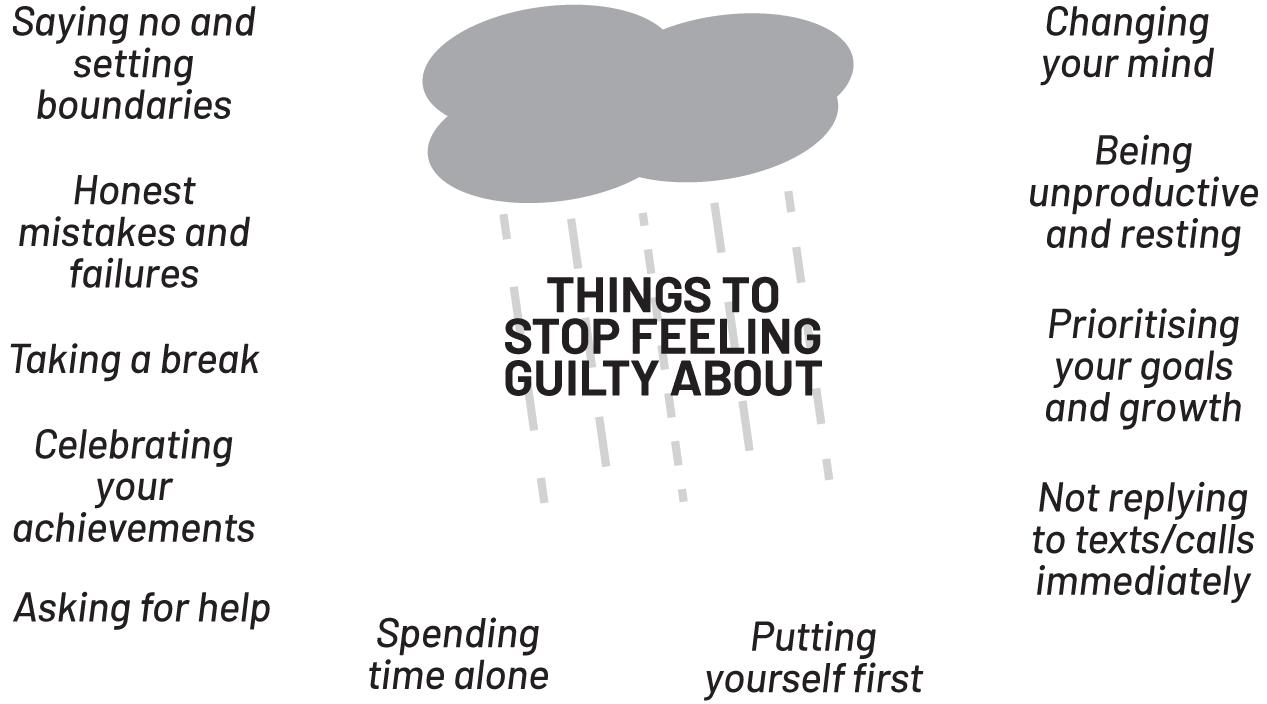
Guilt is a powerful emotion. Generally, it causes us to fixate on:
- what we did wrong
- what we should have said
- how we should have acted
- what we could have done differently.
While some guilt can be used to incite positive change in our lives, most of the time it lingers on our mind and can cause significant negative effects on our physical and mental wellbeing. Here are some tips to help you stop feeling guilty for things you don't need to.
ASSESS YOUR FEELINGS
Our minds have a way of using guilt as a cover for other deeper feelings, such as low self-esteem, resentment or anxiety. Instead of feeling confident in your decision to stay home on a Friday night to rest, you may feel anxious that your friends will think you're a selfish or bad person. This anxiety results in feelings of guilt. The next time you feel guilty, think about the root cause making you feel this way, and question the validity and accuracy of these feelings.
ACCEPT YOUR PAST
We all make mistakes along the way, so there is no reason to hold on to these feelings. Take time to reflect on your past mistakes and experiences. Accept that these have occurred in the past and give yourself permission to let go of any guilt that you may still be holding on to. It’s time to focus on the present moment and opportunities instead.
OWN YOUR DECISIONS
If you make a decision, it is your responsibility to own it. You are setting these boundaries, taking a break, saying ‘no’ or prioritising your goals for a reason. When you start feeling guilty about a decision you have made, remember why you made it in the first place. Take control of the decision, and be confident in the reasons behind it.
CHANGE YOUR PERSPECTIVE
We often overthink decisions or issues and struggle to see the bigger picture around us. Something small may seem larger than it is until you look at it from a new perspective. If you feel guilty about a mistake or changing plans on someone, take a step back and ask yourself if your guilt makes sense. It may also be helpful to ask yourself: ‘What would I tell a friend in a similar scenario?’
DEVELOP EMPOWERING SELF-TALK
The thoughts you continually keep are the ones that will manifest into your life. The guilt of not replying to a text immediately or for taking a break or for asking for help is the result of you thinking: ‘Am I being rude?’ or ‘I'll never get this done’ or ‘I am not good enough’. When we reframe these limiting beliefs into empowering beliefs, we start to reprogram our minds into accepting the reasoning behind our actions and removing the guilt associated with them. Change these thoughts to: ‘I'm prioritising my own wellbeing’ or ‘I will do my best to get this done’ or ‘I'm still learning and improving’.
DON'T QUESTION YOUR PRIORITIES
Feeling guilty often leads us to question and become flexible with our priorities. You have made your priorities clear for a reason. Keep these at the front of your mind when making decisions, and don't second guess or question their importance. You do not need to justify or rationalise what you choose to put first.
HOW TO STOP CARING ABOUT WHAT OTHER PEOPLE THINK
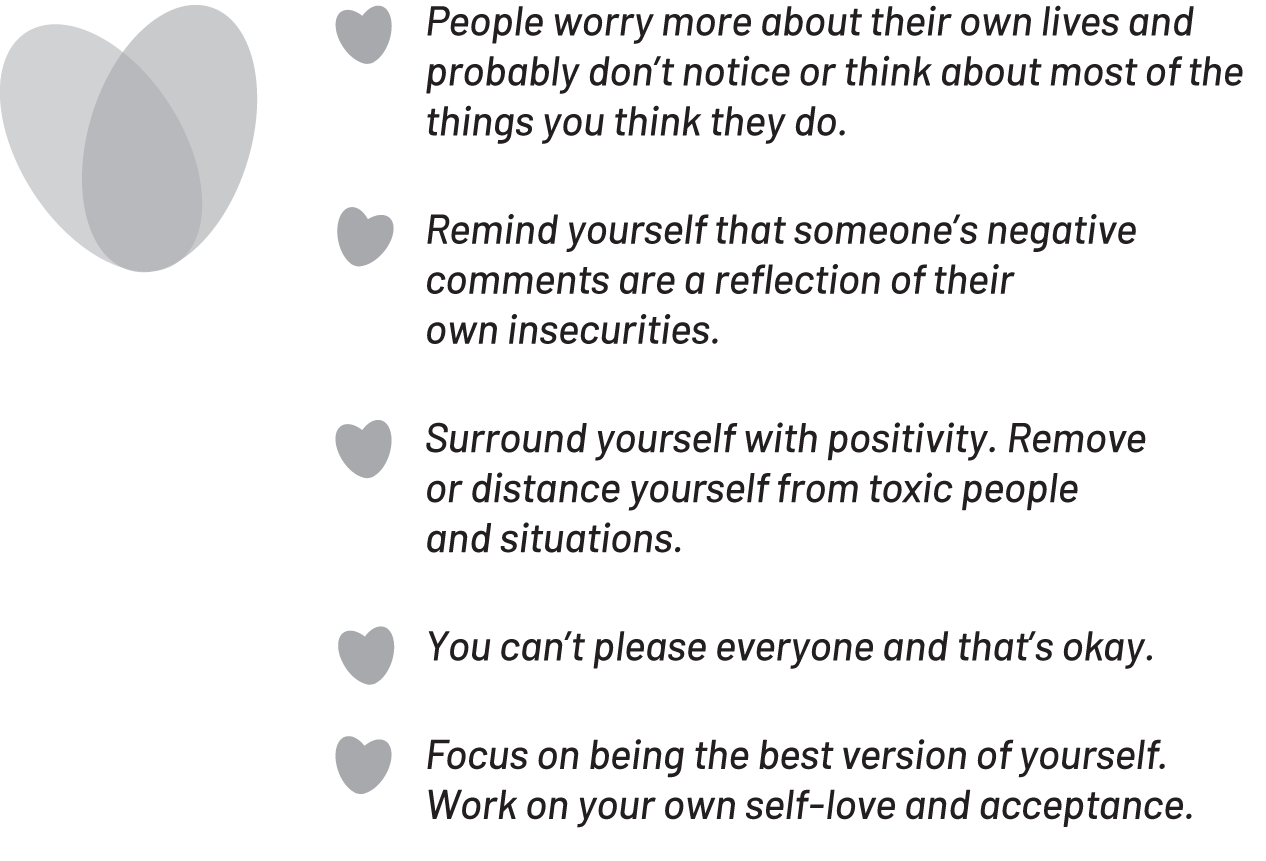
If you always worry about what others think of you, or you allow their opinions — or what you perceive their opinions to be — to take control of your thoughts and actions, ask yourself this: How often do you think about other people? How often do you really care about how they live their lives or what they do? Probably not that often, right? The same applies to you. People are so consumed by their own lives and their own worries and issues that they probably don't notice or give a second thought to most of the things you think they do.
There will always be people in the world who have something negative to say. This could be directly to your face, via an online comment or message, or behind your back. Instead of allowing these negative comments to hold power over you and your self-worth, remember that these comments almost always stem from the person's own experience and their insecurities, jealousy and unhappiness. A happy, confident person does not have the time or desire to spread negativity about others.
What's more important is surrounding yourself with genuine people who will support you, keep you accountable and provide constructive criticism with the sole purpose of helping you grow and flourish. On a personal level, work on yourself and understand what truly makes you happy. Life is short. Be confident in the decisions you make, and live your life in accordance with your authentic values. You do not have to wait for someone else to see your value before you start believing in yourself. Do not shrink yourself, play small or water yourself down to please others.
The reality is you will never be able to please everyone. You could be the nicest, kindest and most selfless person in the world, and there will still be someone who has something negative to say about you. Once you accept the fact that you will never be able to control other people's thoughts and opinions, you can fully focus on becoming the best version of yourself.
HOW TO BOOST YOUR SELF-CONFIDENCE
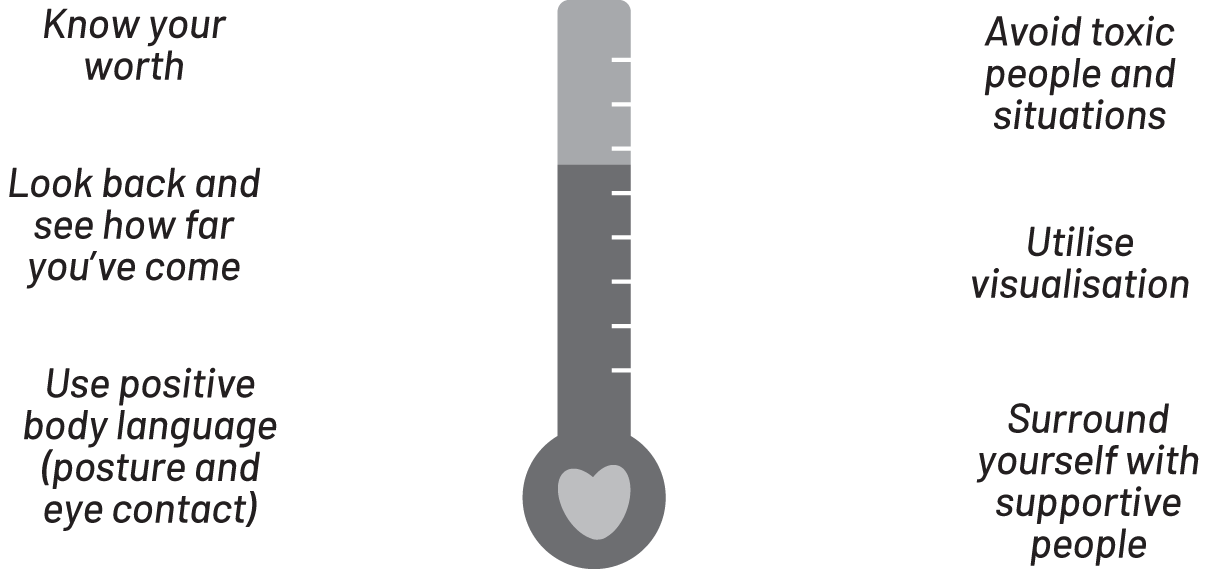
We are often our own biggest critic. We fill our heads with irrational thoughts, fears, self-doubt and excuses, which leaves us feeling stressed, anxious and holds us back from achieving our goals. The key to overcoming this is to build confidence in who you are and controlling your thoughts and actions.
KNOW YOUR WORTH
To be truly confident, you must know your worth and how much you bring to the table. Once we are able to believe in ourselves and accept our strengths and weaknesses, we develop the confidence to get through any life situation. Practise gratitude and engage in positive self-talk. Forgive yourself for past mistakes. Stop comparing yourself to others and embrace what makes you unique.
LOOK BACK ON HOW FAR YOU HAVE COME
Thinking about past successes or something you are proud of is a quick and effective tool to push you out of a low-confidence state. Re-live the moment when you achieved an accomplishment, remind yourself of the actions you took, how it felt during the process and how you achieved that outcome. Reminding yourself of how much you have achieved and of all the challenges you have overcome in the past helps to re-frame your mind to think in a more positive way.
USE POSITIVE BODY LANGUAGE
Your body language is a tell-tale sign of whether you are feeling confident or are in a state of low confidence. When we think about a confident person, we imagine them sitting up straight or standing up tall with their shoulders back, and walking with purposeful strides. This is for good reason. Projecting confident body language can help our minds believe that we are confident. An extension of this is in the clothes you wear. Dress up for you, not for others. Wearing an outfit you love and feel good in can dramatically increase your confidence.
AVOID TOXICITY
Take yourself out of any toxic environment or relationship that is putting you down and negatively impacting your self-confidence. If you have a friend who always has a negative comment to make about you, set up boundaries and distance yourself from interacting with them. Same goes for that one family member who constantly judges your career or life choices.
UTILISE VISUALISATION
Visualisation is a powerful technique that is used by self-confident people on their journey to success. It involves regularly thinking about achieving your goal and how you made it happen. This sends a message to your brain that achieving this goal has already happened, so when you are faced with the scenario in real life, your brain is already familiar with the situation and approaches it with certainty and confidence. For more on this, see the discussion on goal setting in chapter 12.
FIND YOUR SUPPORT CIRCLE
While confidence should come from within, the people we surround ourselves with play an important role in pushing us along in times of need. No matter what you are trying to achieve, surround yourself with people who give you confidence and positive support. This might be that one friend who understands your goals and is cheering you on along the way; joining a group of similar-minded people who support each other; or finding a mentor/coach who can be there to guide you and push you to become the best version of yourself.
HOW TO CELEBRATE YOURSELF
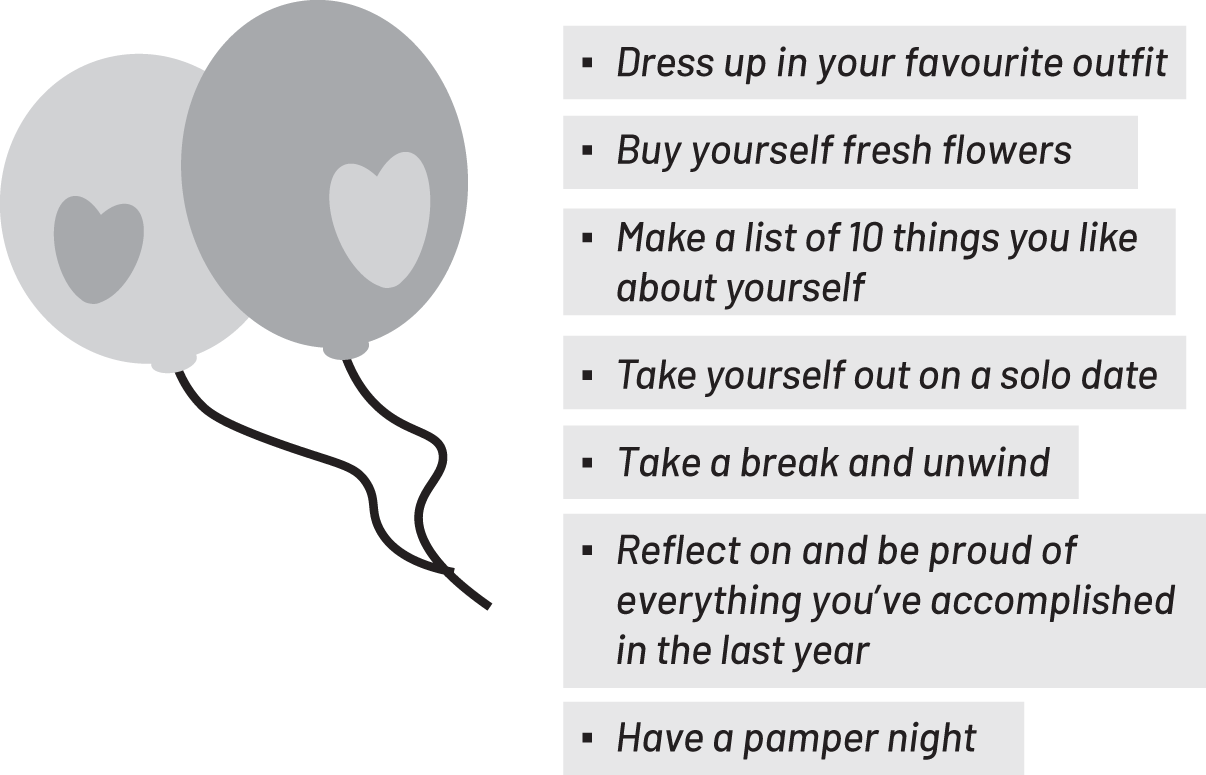
The longest relationship you will ever have is with yourself. Why is it then that it is often the one relationship that we treat the most poorly? We talk a lot about cultivating our friendships and relationships, but nurturing the relationship we have with ourself is equally, if not more, important. Invest love, time and energy into becoming your own biggest fan and celebrating yourself along the way. The more you celebrate yourself, the more your happiness and confidence rises.
It's not bragging. It's not selfish. And you don't have to wait until your birthday. Celebrating yourself is simply about recognising and acknowledging how amazing and unstoppable you are. It's about making a commitment to prioritise yourself and focus on your needs. It's about celebrating every win, no matter how big or small. Because you deserve it.
There are many ways to celebrate yourself daily, weekly and yearly.
DAILY CELEBRATIONS
- Remind yourself of your favourite qualities.
- List five things you're proud of yourself for.
- Pick up your favourite sweet or a fresh bunch of flowers.
- Accept compliments by saying ‘thank you’ instead of deflecting them.
- Get dressed up in your favourite outfit.
- Do something that makes you happy.
WEEKLY CELEBRATIONS
- Schedule a pamper night.
- Reflect on the work/task you completed and your progress towards your goals.
- Take yourself out on a solo date.
- Take a day off just to ‘do nothing'.
YEARLY CELEBRATIONS
- Make that purchase that you have been saving for all year (as long as it aligns with your financial goals and values).
- Book yourself a holiday or weekend away with your partner/friends/family.
- Reflect on everything you have accomplished in the past year.
THINGS YOU DON'T NEED TO JUSTIFY
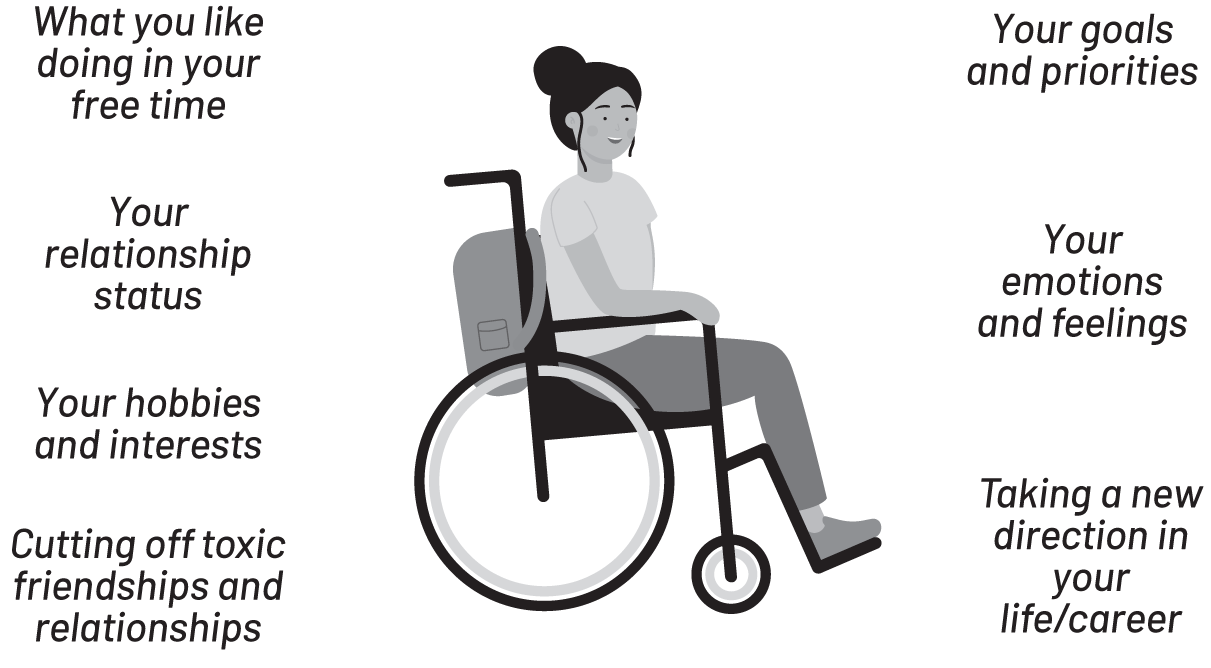
When we let the opinions of others dictate our actions and feelings, we get distracted from pursuing our own true happiness. Feeling like you need to justify your decisions and behaviours can stem from personal life experiences, how you have grown up, or it could be a product of your current environment. When someone questions a decision you have made or your viewpoint on a topic, they are often projecting their own values and insecurities onto you. Comments like, ‘Why aren't you married yet?’ or ‘You're changing careers? What a waste of all those years!’ or ‘If I were you, I would never have done that’ are examples of this.
We all see things differently in this world. We all have different values, goals and definitions of fulfillment and happiness. There is no ‘right’ path or timeline that we have to follow. The only thing that truly matters is that you live your life according to your own set of goals and priorities, and make the best decisions for you based on your own wants and needs. Never feel like you have to justify any of the actions, behaviours, feelings or values that are pushing you towards your own goals and growth.
TIMELINES DON'T EXIST
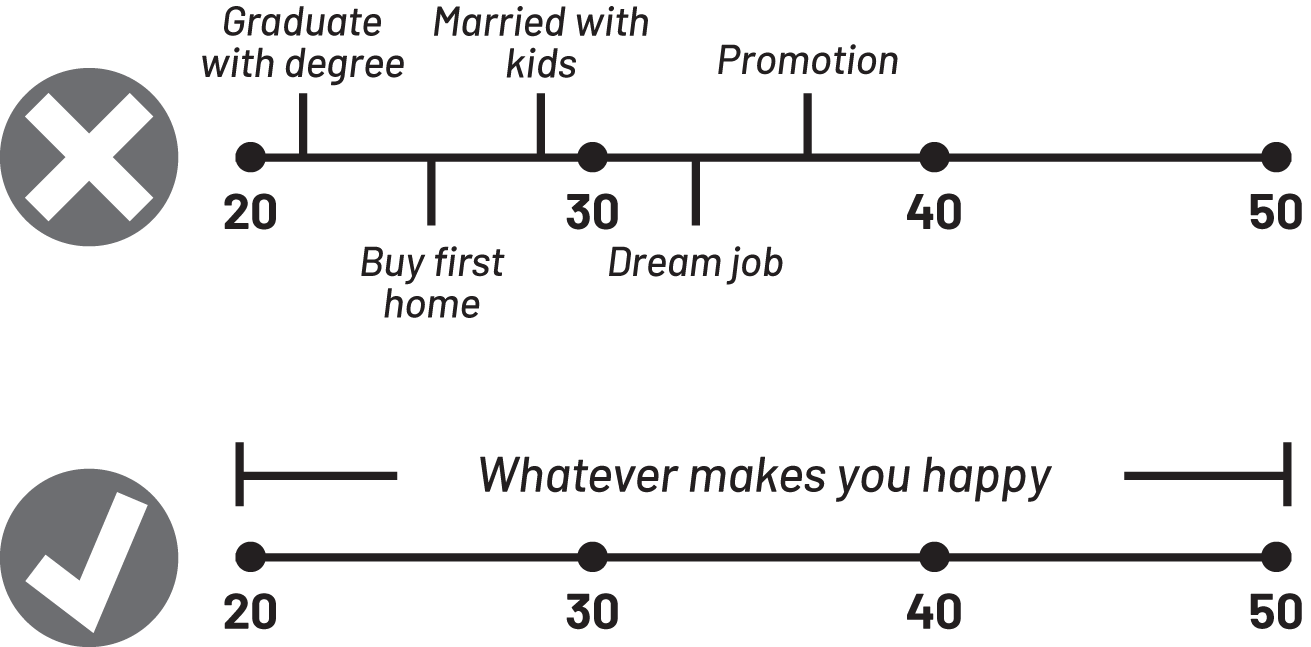
Life is not a race. Nor is it a competition. There is no designated time for anything in your life. There's no checklist of milestones to tick off. There are over seven billion people on this planet and every single person cannot follow the exact same arbitrary timeline. You're not ‘behind’ in life. There is no expectation to do anything by a certain age. You don't have to get a degree by 21, be married by 30 and land your dream role before you turn 35. It's all made up.
There's no one ‘right’ pathway to follow. You are on your own path and what route you take, where you are headed and when you will get there is totally unique to you. The only rule in life is to pursue what makes you happy. To find and fulfil your purpose. And to wake up every morning filled with gratitude for the life you have created for yourself.
THINGS YOU WILL NEVER REGRET
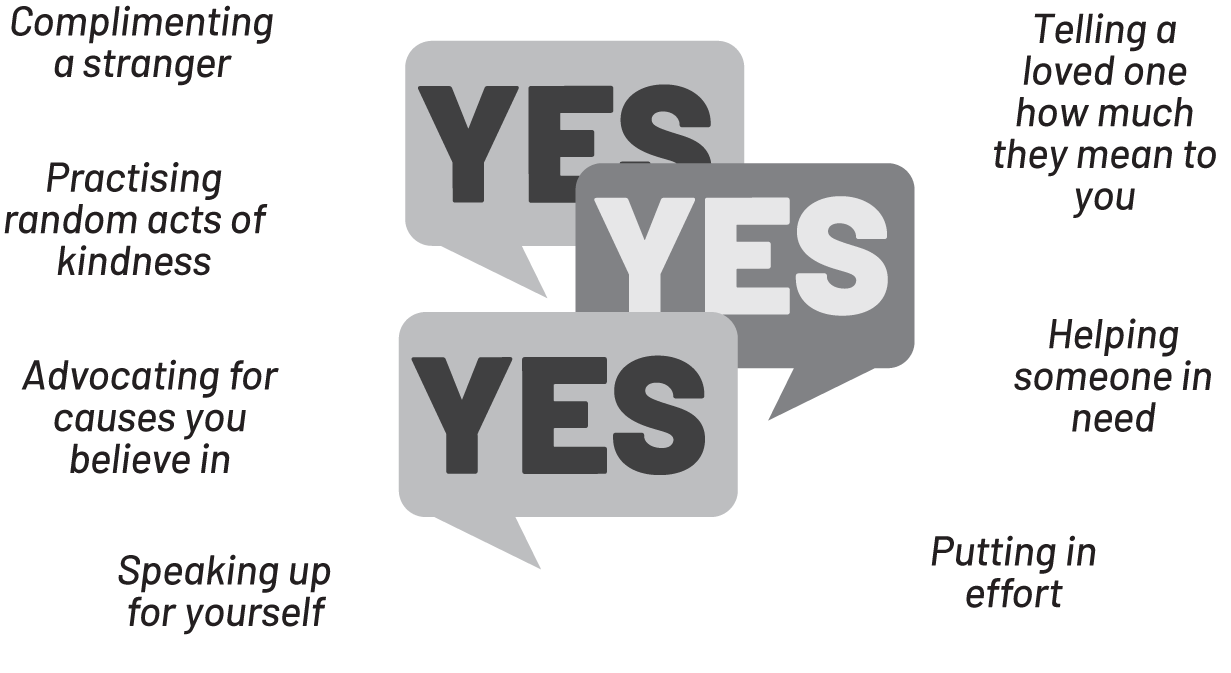
There are many things in life that we will never regret doing. On a personal level, you will never regret putting in effort, believing in yourself or upholding your values. No matter the outcome, the most important thing is knowing that you gave your all to your goals, work and relationships. This works hand in hand with always believing in yourself and having the self-confidence to live your life authentically. If you can stay true to yourself, you will be able to stand up for yourself and advocate for the causes you believe in.
On a broader level, you will never regret expressing your love and admiration for the important people in your life. There are not too many more satisfying acts in life than being able to help someone and bring a smile on their face. This can be as simple as giving someone a compliment, telling someone how much they mean to you, performing a random act of kindness or helping someone who you know is in need. Seeing a smile on someone's face will promote the positivity within you, and boost the mood of both you and the other person.
